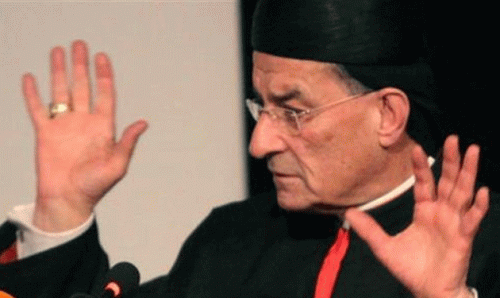Cardinal Beshara al-Rai slammed the Hezbollah militant group on Wednesday , accusing it of dragging Lebanon into many wars.
“If its weapons are supposed to be against Israel, why is Hezbollah dragging us into wars in other places,” al-Rai asked in a TV interview.
The reasons behind Lebanon’s isolation are known, according to the Cardinal who proposed restoring Lebanon’s neutrality for the interest of the country.
“Neutrality will preserve the country’s sovereignty and protect it,” he said, rejecting having “states” within the state in Lebanon.
His comments come after reports by Hezbollah linked media revealed that that the Vatican had asked the Patriarch to “temper ” his criticism of Hezbollah, after president Aoun met with the Pope to promote Hezbollah as a protector of the Christians in Lebanon and the region and after Pope promised Aoun that he will visit Lebanon soon.
Not the right time for the papal visit
Commenting on the proposed papal. visit to Lebanon Cardinal al-Rai said that Lebanon’s political crisis poses a challenge for organizing a potential papal visit.
In an interview with ACI Stampa, CNA’s Italian-language news partner, Cardinal Rai said that stability was needed to make Pope Francis’ dream of visiting Lebanon possible.
“The Pope has always said that he wants to come to Lebanon, but in this political crisis, it is difficult to organize the trip. We need stability,” Rai said in the interview
Cardinal Rai reiterated his call for the restoration of Lebanon’s neutral status to improve the country’s economic stability and security.
“We need a special international conference of Lebanon, under the auspices of the United Nations, to complete the implementation of the 1984 agreements, because all the militias have disbanded except Hezbollah. It takes a resolution that meets international demands,” Cardinal Rai said.
Though Lebanon endured a 15-year civil war starting in 1975, in recent years it stood out as a relatively peaceful and pluralistic society in the Middle East.
An estimated 60% of Lebanon’s people are Muslim, evenly split among Sunni and Shiites, and nearly 35% of the almost seven million population is Christian, most of whom are Maronite Catholics.
“Unfortunately, there are Lebanese who believe religions are the problem. This is the case with Hezbollah, which claims to be completely tied to Iran and Iranian politics,” the cardinal said.
“It is the problem that a Lebanese political party bears arms.”
Hezbollah, a Shiite political and militant group designated as a terrorist organization by the U.S. government and several Western and Arab countries , has strong alliances with Bashar al-Assad’s regime in Syria and Iran in its conflicts with Sunni-majority Gulf states.
Hezbollah has held significant political sway in Lebanon for the past 30 years. A mass protest movement in the country, which began in October 2019, included calls for Hezbollah to give up power after years of government mismanagement and corruption.
The Maronite patriarch said that Hezbollah’s rejection of the country’s pact between Muslims and Christians “creates an internal political problem, which brings with it an economic problem, which creates a social crisis.”
Pope Francis had said that he wanted to visit Lebanon during an in-flight press conference on his return flight from Iraq in March 2021.
A few months later, a Vatican official said that the Pope intended to travel to Lebanon once it successfully formed a government.
After the formation of a Lebanese government last September, there was speculation about a potential papal trip, but the country still faces a severe crisis.
The World Bank has described Lebanon’s financial situation as among the “most severe crisis episodes globally since the mid-19th century.” It estimates that the country’s real GDP contracted by more than 20% in 2020, with surging inflation and high unemployment.
Lebanon’s currency plummeted in 2021. By June that year, the Lebanese pound had lost 90% of its value since October 2019. For months, the state was only able to provide electricity for less than two hours a day.
In January, the World Bank expressed concern about the collapse of basic public services in Lebanon, which continues to suffer a “brain drain,” as well as debilitating internal political discord.
According to Cardinal Rai, the large number of refugees in Lebanon has further strained the economic crisis.
“We are four million inhabitants and we welcomed two million refugees,” he said, noting that Lebanon’s small size exacerbated this burden.
Lebanon’s total area is only about 4,000 square miles, roughly two-thirds the size of the U.S. state of Connecticut.
“Lebanon is unique in the Arab world. In the Arab world, there is a singularity of religion, culture, and of opinion, but Lebanon is completely different, it is the opposite, it is the plurality of religions, democracies, cultures, participation,” Cardinal Rai said.
“Lebanon goes against the current. It is a place of encounter, it is a special place,” the Cardinal stressed
National Catholic Register/ Ya Libnan


Leave a Reply
You must be logged in to post a comment.